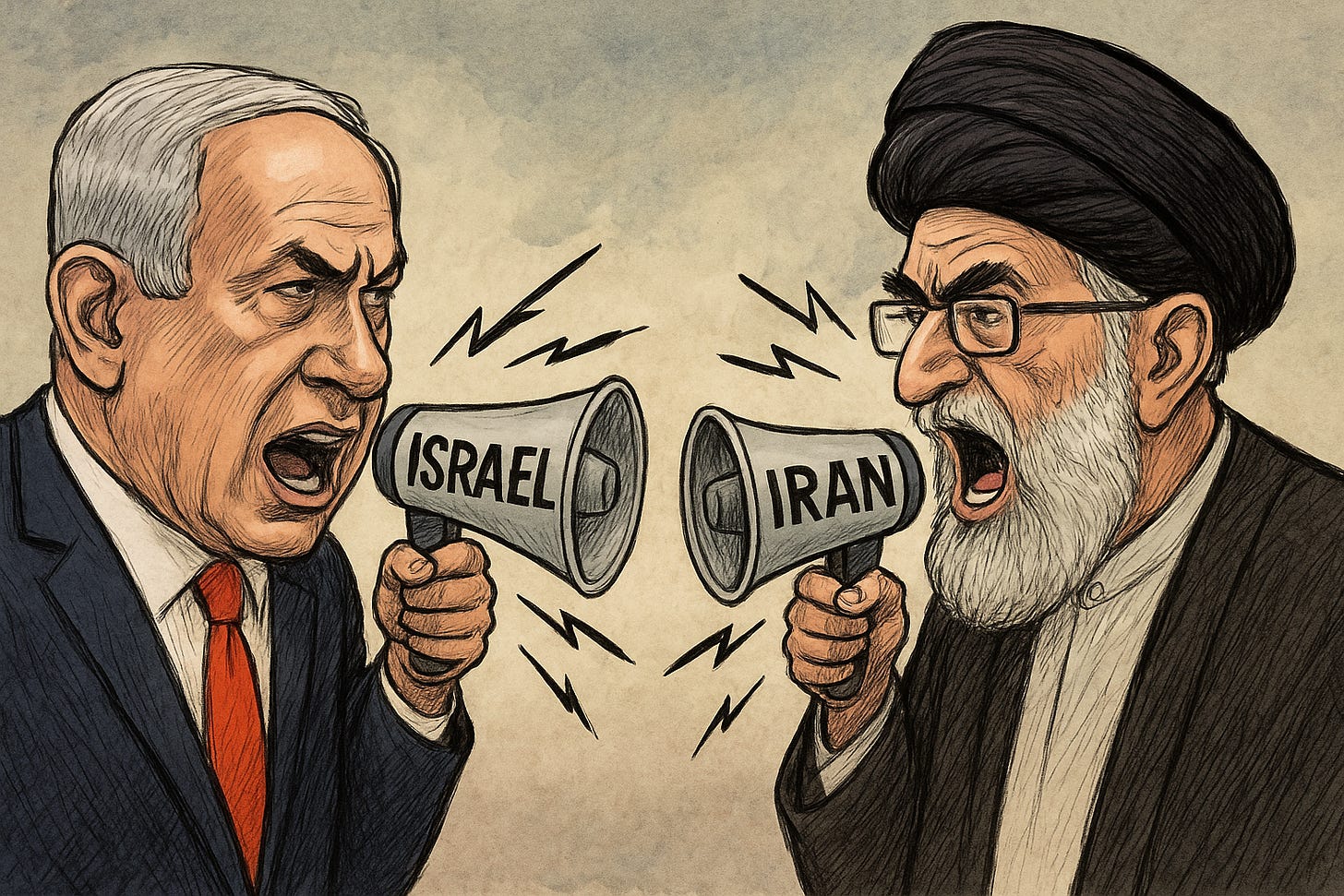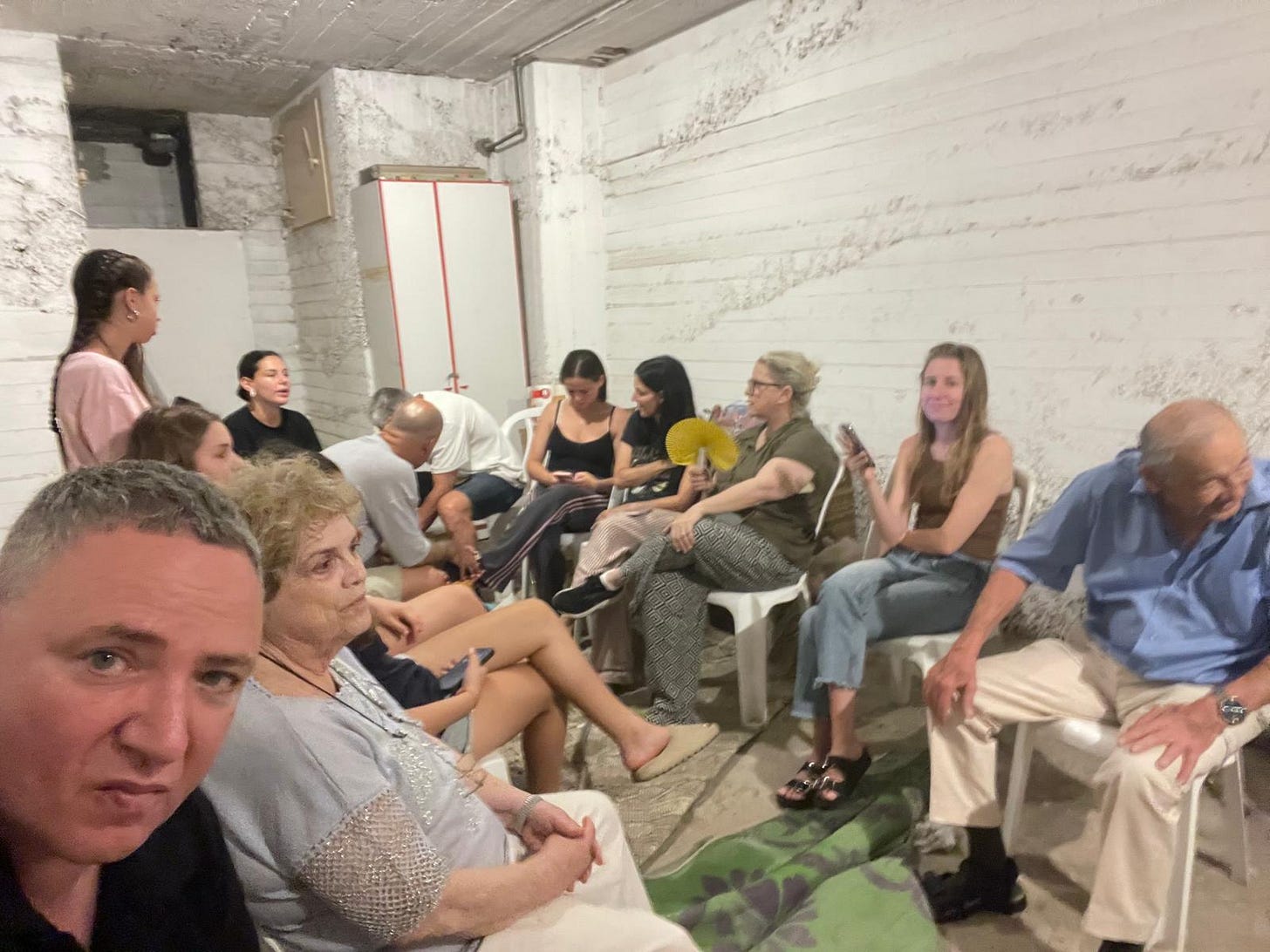Summing up a week that changed things: Inside the Israel–Iran war
ASK QUESTIONS LATER investigated war strategy, narrative wars, geopolitical brinkmanship and the absurdity of air raid shelters
It has been one week since Israel attacked Iran — an escalation that can be seen as a consequence of the October 7, 2023 Hamas invasion. Israel has since fought a multi-front campaign: against Hamas in Gaza, Hezbollah in Lebanon, the Houthis in Yemen, militants in the West Bank, and even Shiite militias launching drones from Iraq. It not only accuses Iran of developing nuclear weapons but of orchestrating a terrorist "ring of fire" encircling it.
According to this view, the Oct. 7 massacre aimed to derail the Saudi-Israeli normalization process, and sadly succeeded. So in a sense, everything since then has led to direct confrontation between Israel and the Islamic Republic.
Over the past week, we covered battlefield developments, geopolitical implications and human stories (and offered much TV and podcast content, such as here with Matt Robison). It’s among the more comprehensive coverage of this conflict, and while perhaps too much for some readers, anything less seems frivolous. We hope for a swift end. Meanwhile, as a public service, here’s a curated collection with paywalls temporarily lifted.
If you appreciate this depth of coverage and would like complete access with community commenting and chat rights — and want to help enable independent journalism — consider clicking on the button below. It costs a pint of beer a month and gives the value of at least a gallon. NOW IS THE TIME.
First, the latest TV discussions on the bewildering choices of a cease-fire versus a US entry into the fray — as Trump suggests a two-week window. Misdirection? Buying time? Pressure tactic? We break it down.
The Israel–Iran war of narratives
One week into the Israel–Iran war, what began as a targeted escalation now threatens to redraw the global order. With Israel striking military leaders and facilities deep inside Iran, Tehran retaliating with missiles that hit civilian areas, and the US mulling an entry, there are fears of a broader regional conflict and even global repercussions, from oil shocks to opportunistic moves by China or Russia. This deep dive unpacks the narratives both sides are pushing, the moral and legal debates around regime change and targeted killings, and the growing sense that the world has entered a perilous chapter.
The Six Day War (So Far)
This story is a tour-de-force summation of the Israel–Iran war's first week, weaving together the military, geopolitical, cyber, moral, and narrative fronts into a comprehensive, high-stakes analysis. It examines Trump’s strategic calculus, Israel’s operational dominance, Iran’s options, and the global ripple effects — from oil markets to MAGA fractures and shifting Middle East alliances. Blending hard data with sharp political insight, it captures the asymmetry of the war, the ethical fog around regime change and targeted killings, the cyberwarfare that's shaping the battlefield, and the fragile nature of Israel’s international support. It’s not just a recap — it’s a blueprint for understanding what’s unfolding, what’s at stake, and what might come next.
Trump’s options
Renowned war correspondent Chris Stephen offers a sweeping, deeply informed analysis of the war’s X-factor: potential US military intervention. With Trump amassing overwhelming air and naval power across the region — including carrier groups, stealth bombers, and 27 refueling tankers — the US is positioned to strike. Stephen explores how protecting global energy routes, deterring missile attacks, and possibly crippling Iran’s nuclear program are all on the table. He underscores that while a ground war is unlikely, precision raids, targeted assassinations, and bunker-busting bombings remain real options. With insight into doctrine, regional politics, and oil dynamics, this piece is a masterclass in military readiness, global risk, and how regime change can happen — without boots on the ground.
Is regime change in Iran actually possible?
This piece explores how Israel’s military campaign against Iran’s nuclear program may serve a larger, tacit goal shared by Israel, the US, and some Arab states: regime change in Tehran. It argues that while Washington maintains a posture of non-involvement, Israel’s actions likely enjoy U.S. approval — and may even be coordinated with Trump’s own 60-day ultimatum to Iran. The analysis traces how recent Israeli airstrikes have severely damaged Iran’s military and nuclear infrastructure, potentially weakening the regime and setting the stage for deeper Western involvement. It outlines various paths to regime collapse — from U.S. ultimatums and cyberwarfare to internal military coups — while weighing the moral and practical risks of foreign-imposed regime change. It concludes that regime change. if possible at all, must be driven from within, most likely in the force of a palace coup.
A bomb shelter during wartime
It begins at 3 a.m., where sirens slice through sleep and stairwells become rivers of panic and humanity. An elderly visitor falls, kindness halts the rush, and grace briefly overtakes fear. In the shelter below — metal doors, plastic chairs, backgammon, and birthday cake — neighbors gather in that strange Israeli blend of tension and absurdity. There are explosions above, dogs begging for chin rubs, transistor radios crackling with dread, and whispered arguments about politics and pliers. This is life in Israel now — part war diary, part family drama, part dark comedy. A nation frayed by internal wounds, bombarded from without, still making jokes, still sharing chocolate cake.
Israel should know when to fold 'em
Israel’s strike on Iran is a historic tactical success — a daring blow that crippled nuclear infrastructure, exposed Tehran’s military vulnerabilities, and reaffirmed Israel’s red lines. But as the dust settles, the true test lies ahead: shaping an endgame that avoids open-ended war and catalyzes deeper strategic gains. This piece calls for clear-eyed restraint. It argues that the campaign should now pivot from airpower to diplomacy — leveraging Israel’s achievements to support U.S.-led coercive talks aimed at disarming Iran’s nuclear and proxy threats. To preserve global legitimacy, Israel must also address its Palestinian policy. Boldness opened this chapter; only wisdom can close it with a horizon for Israel, for Iran’s people, and for regional stability.
Iran's regime must be brought to heel
This piece, hours after the strike began, argues that it is a necessary and justified response to an intolerable threat — one supported by near-unanimous consensus within Israel, even among critics of its leadership. While Israel lacks the capacity to fully eliminate Iran’s deeply buried nuclear facilities alone, the operation signals a firm reassertion of red lines, delivers a major blow to Iran’s capabilities, and exposes its vulnerabilities — militarily, economically, and diplomatically. Rather than endless negotiations, the path forward should combine military deterrence with diplomatic pressure focused on Iran’s malign activities — especially its regional proxy militias.
LIVE appearance on Worth Knowing
EXTRA FROM LAST YEAR: Shah’s son says regime change possible, offers vision of Iran as West’s ally
In an in-depth interview with AQL last year, Reza Pahlavi, son of Iran’s last Shah, outlines a path for peaceful regime change in Iran—led from within, but supported by the West. He argued that the Islamic Republic is loathed by the majority of Iranians, including many within the military and even the clergy, and believes that with targeted international pressure and support, a collapse or internal coup is plausible. He envisioned a secular, democratic Iran at peace with Israel and reconnected with the global community. Positioning himself not as a monarch-in-waiting, but as a transitional figure, Pahlavi emphasized the need for a unifying leadership to guide Iran to free elections and constitutional reform. He believes the moment could come swiftly—if the world helps tip the balance.







Just think — all of this stems from Netanyahu's decision to choose war over diplomacy, and now the future hinges on the decision of an obstinate 86 year old religious zealot and a 79 year old leader who has the impulse control of a two year old.